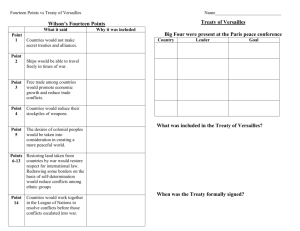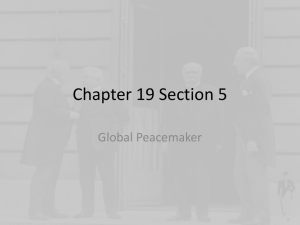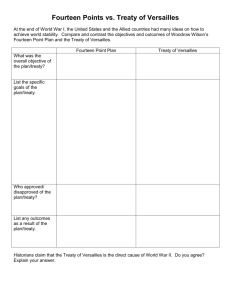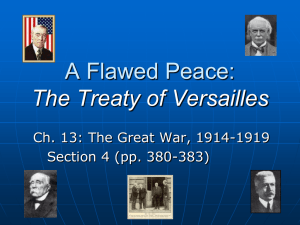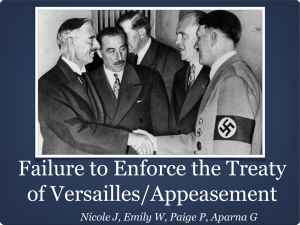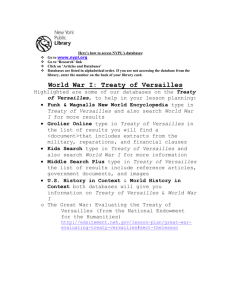The Treaty of Versailles and its Consequences by James J. Atkinson
advertisement
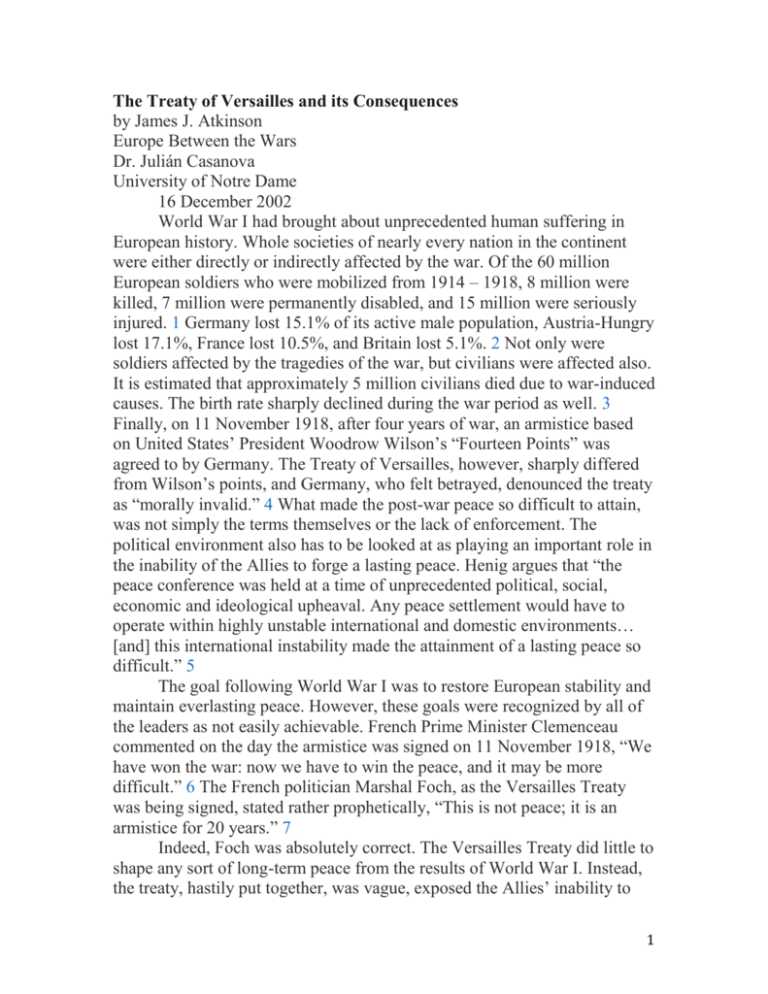
The Treaty of Versailles and its Consequences by James J. Atkinson Europe Between the Wars Dr. Julián Casanova University of Notre Dame 16 December 2002 World War I had brought about unprecedented human suffering in European history. Whole societies of nearly every nation in the continent were either directly or indirectly affected by the war. Of the 60 million European soldiers who were mobilized from 1914 – 1918, 8 million were killed, 7 million were permanently disabled, and 15 million were seriously injured. 1 Germany lost 15.1% of its active male population, Austria-Hungry lost 17.1%, France lost 10.5%, and Britain lost 5.1%. 2 Not only were soldiers affected by the tragedies of the war, but civilians were affected also. It is estimated that approximately 5 million civilians died due to war-induced causes. The birth rate sharply declined during the war period as well. 3 Finally, on 11 November 1918, after four years of war, an armistice based on United States’ President Woodrow Wilson’s “Fourteen Points” was agreed to by Germany. The Treaty of Versailles, however, sharply differed from Wilson’s points, and Germany, who felt betrayed, denounced the treaty as “morally invalid.” 4 What made the post-war peace so difficult to attain, was not simply the terms themselves or the lack of enforcement. The political environment also has to be looked at as playing an important role in the inability of the Allies to forge a lasting peace. Henig argues that “the peace conference was held at a time of unprecedented political, social, economic and ideological upheaval. Any peace settlement would have to operate within highly unstable international and domestic environments… [and] this international instability made the attainment of a lasting peace so difficult.” 5 The goal following World War I was to restore European stability and maintain everlasting peace. However, these goals were recognized by all of the leaders as not easily achievable. French Prime Minister Clemenceau commented on the day the armistice was signed on 11 November 1918, “We have won the war: now we have to win the peace, and it may be more difficult.” 6 The French politician Marshal Foch, as the Versailles Treaty was being signed, stated rather prophetically, “This is not peace; it is an armistice for 20 years.” 7 Indeed, Foch was absolutely correct. The Versailles Treaty did little to shape any sort of long-term peace from the results of World War I. Instead, the treaty, hastily put together, was vague, exposed the Allies’ inability to 1 cooperate toward an agreement, and fueled German nationalism from resentment over her treatment by the Allies in the treaty. Hobsbawm argues that “the Versailles settlement could not possibly be the basis of a stable peace. It was doomed from the start, and another war was practically certain.” 8 The principle reasons for the failure of the Treaty of Versailles to establish a long-term peace include the following: 1) the Allies disagreed on how best to treat Germany; 2) Germany refused to accept the terms of reparations; and 3) Germany’s refusal to accept the “war-guilt” clause, Article 231, led to growing German resentment and nationalism. The Versailles Peace Conference exposed the ideological rift growing between the Allies. Throughout Versailles and After, Henig argues that Britain and France had “contradictory viewpoints” 9 regarding the treatment of Germany. While public opinions of both nations were strongly in favor of seeing Germany pay to the fullest extent, only France saw Germany as a potential threat to the future security of European stability. Thus, while Britain saw Germany as a “barrier-fortress against the Russians” 10 and an economically strong nation with which to engage in international trade, the French viewed Germany as a threat to French security. France feared that not levying harsh enough penalties upon Germany would only make her stronger and she would eventually rise up against France in revenge. So while the British felt that the Treaty of Versailles was too harsh on Germany, France felt as though it were not harsh enough. One aspect to deal with was German disarmament. Kitchen explains that “there was general agreement that Germany should be disarmed but considerable differences about how this should best be achieved.” 11 Eventually, the Allies came to an agreement regarding the new state of the German military. The German navy was to be limited to 15,000 officers and men, six battleships, six light cruisers, twelve destroyers, and twelve torpedo boats; meanwhile, the army was to be restricted to 100,000 men who would be obliged to enlist for twelve years. 12 The preamble of the military section of the treaty with Germany suggests that Germany was to be disarmed “in order to render possible the initiation of a general limitation of the armaments of all nations.” 13 This is all well and good, except the Germans never abided by this part of the treaty. One of the most crucial omissions of this section was the absence of time limits, which undoubtedly worked in Germany’s favor. 14 No one could possibly expect Germany to be disarmed forever. The treaty, however, offered no hint as to how long the disarmament should last. This, therefore, was one of the parts of the treaty that Germany continually abused and disobeyed out of bitterness. 2 As it appeared that Germany would not abide by the disarmament policy for good, France began to worry, and for good reason. They had been unable to secure an alliance with Britain or the United States. Britain’s military budget had taken severe cuts and her government was more interested in securing her extra-European overseas colonies than in aiding her intra-European allies, such as France. Britain, unlike France, never seriously expected Germany to become a threat to the peace effort. 15 But there was the looming threat: “the Treaty of Versailles had left [Germany] largely intact, with a population almost double that of France, and with no powerful east European neighbours.” 16 Negotiations regarding the territorial claims also sparked heated debate among the Allies. In fact, the entire peace conference almost ended early when France began to demand that an independent Rhineland and Saar come under French occupation. While France argued that she wanted the western German frontier to end at the Rhine for security reasons, British Prime Minister Lloyd George feared that this would most likely result in a future conflict between the two states. 17 Henig puts the situation best by saying, “While the British government saw 66 million potential German customers, the French government trembled at the prospect of 66 million German soldiers and possible invaders.” 19 France and her Allies eventually came to a painful compromise that the Rhineland would be occupied by Allied troops for 15 years and free of German forces for an unspecified period of time. Another issue of significant note is how the Allies dealt with the war reparations that Germany owed. One of the major questions regarding the reparations was the following: should Germany be held accountable for what she owed to the Allies or should she be held accountable for what she could afford to pay? But even answering these questions became difficult to answer. For instance, for how much was Germany accountable? Was Germany to pay for all of the damage assessed? And how was the damage assessed? Were the damages to include government costs such as war pensions? France felt that Germany should “cover the costs of restoration of invaded territories and repayment of war debts [and that] a long period of stiff repayments … would have the added advantage of keeping Germany financially and economically weak.” 19 Britain, on the other hand, was concerned with the revival of international trade and knew that if Germany was heavily in debt with the Allied Powers, she would not be able to purchase British goods in sufficient quantities. 20 Because of all of the ambiguities involving the war reparations, an exact monetary figure owed by the Germans to the Allies was never included in the Treaty of Versailles. 3 For Germany, the terms of reparations eventually arrived at by the Reparations Committee were unacceptable. The German delegates viewed the economic sanctions as being far too harsh. The final telegraphed communication from the German National Assembly to the Allies in Versailles stated, “The government of the German Republic in no wise abandons its conviction that these conditions of peace represent injustice without example.” 21 The British economist John Maynard Keynes wrote in 1920 The Economic Consequences of the Peace in which he argues that the German economy would be destroyed by the post-war Versailles Treaty. Kitchen claims that according to Keynes, “a series of treaties which overlooked the really important issues of economic recovery, food, fuel, and finance would further exacerbate the situation.” 22 The fact of the matter is that Germany never felt as though they were defeated in World War I. Therefore, they had a hard time accepting the fact that they should have to pay for anything. Keynes’ work provided German supporters with all the arguments they needed against the reparations and reconstruction efforts of the Versailles Treaty. Keynes refers to the economic terms as “outrageous and impossible.” 23 France, who pushed for harsher German punishment and reparation levels more than any other Allied Power, wanted the reparations to seriously cripple the German state. Sally Marks in The Illusion of Peace states that the treatment of reparations by both sides was “the continuation of war by other means. … Reparations became the chief battleground of the post-war era, the focus of power between France and Germany over whether the Versailles Treaty was to be enforced or revised.” 24 But were the reparations really so economically damaging? Or was that a farce created by Keynes and supported by the German government who wished to avoid further punishment and humiliation? This will be discussed more in upcoming pages. Article 231 of the Treaty of Versailles, which laid the blame for World War I solely on the shoulders of Germany, remains to this day a subject of intense emotional debate among Germans: The Allied and Associated Governments affirm and Germany accepts the responsibility of Germany and her allies for causing all the loss and damage to which the Allied and Associated Governments and their nationals have been subjected as a consequence of the war imposed upon them by the aggression of Germany and her allies. Henig argues that “this clause, known as the ‘war-guilt’ clause, more than any other in the entire Treaty of Versailles, was to cause lasting resentment in Germany.” 25 The Treaty presented to the German delegates at Versailles 4 was a harsh break from the promise of a treaty based on Wilson’s “Fourteen Points.” The Germans felt betrayed by the treaty presented to them and resented the manner in which the Allied Powers were treating them. Because of this seemingly harsh treatment, “every party in Germany, from the Communists on the extreme left to Hitler’s National Socialists on the extreme right, concurred in condemning the Versailles Treaty as unjust and unacceptable.” 26 As James argues, Versailles was indeed “the unifying bracket that clamped German politics together.” 27 Thus, the war-guilt clause and the reparations demanded from Germany did little more than to add fuel to the fire that was growing German resentment and nationalism. Hobsbawm even goes as far to say that the war-guilt clause “proved to be a gift to German nationalism.” 28 Marks argues that “the peace left Germany both powerful and resentful.” 29 It is quite possible, in fact, that German was actually more powerful in 1919 than she was in 1914, especially if one takes into account the deep-seated feelings of resentment that she housed toward her enemies, especially France and Britain. Despite Germany’s claim that the terms of the treaty were far too harsh, most historians today agree that the terms, in fact were “relatively lenient.” 30 Henig alludes to this earlier in her book, when she concludes that “the Treaty of Versailles was not excessively harsh on Germany. … It deprived her of about 13.5% of her territory, 13% of her economic productivity and about 7 million [or 10%] of her inhabitants.” 31 Theoretically, the Allies could have dealt Germany much harsher blows. Then again, unable to effectively enforce this treaty, a harsher one would not have been able to lead Europe any closer to peace. As Foch predicted, the Versailles Treaty was indeed only a 20 year armistice for the European powers. The inability of the Allies to agree on how to deal with Germany, the main war-time aggressor, led to her regain of economic and political strength in the 1920s and 30s. The Second World War, which broke out in 1939, was waged by Germany against the Allies to exact revenge and to finish what could not be completed by World War I. Mazower refers to World War II as “a bloody reopening of accounts by extreme nationalists wishing to revise the Versailles settlement by force.” 32 The Germans had always resented the terms and conditions of the treaty. Now, with the onset of World War II, Hitler appeared to their chance at avenging the wrongdoings set in place by the peace negotiations twenty years earlier. Thus, the Treaty of Versailles failed to bring about everlasting European stability and peace for which the Allied Powers’ governments had hoped. The treaty was put together in haste and the Germans refused to sign it 5 because it treated them, or at least they thought so, too harshly in light of what they had been promised (i.e. a mild treaty resembling Wilson’s “Fourteen Points”). For years afterwards, the Allies and Germany struggled through revision after revision of the treaty until the treaty could bend no more in 1939, with the outbreak of World War II as Germany invaded Poland. What stopped the Treaty of Versailles from ever approaching success, however, was not the terms of the treaty, argues Henig, but rather the reluctance to enforce the terms by the Allies. They were naïve to assume that Germany would cooperate with the treaty terms by themselves. “Thus within a year of the peace conference, the victorious alliance which had defeated Germany and negotiated a set of peace terms had crumbled away. It was this critical collapse, rather than the provisions of the peace terms themselves, which ensured that the Treaty of Versailles was never fully accepted or enforced. Negotiations at the peace conference exposed the divisions between the victorious powers and opened the rifts.” 33 The Allies were strong enough to win the war, but not strong enough to secure the peace. Revision after revision, therefore could not fix what was doomed to failure. In 1939, the Versailles Treaty was proved to be an ultimate failure as the World War continued after the 20-year armistice. 6

